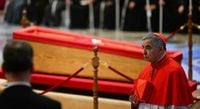In a dramatic turn of events surrounding the upcoming papal conclave, the participation of Cardinal Giovanni Angelo Becciu remains a contentious topic among the College of Cardinals. As the cardinals gather for general congregations in the wake of Pope Francis's death, questions swirl about whether Becciu, who relinquished his cardinal privileges in 2020, will be allowed to vote on the next pope.
Cardinal Becciu, who resigned at the Pope's request following a scandal involving a multimillion-dollar property purchase in London, has been attending public events and consistories since then, always at the invitation of Pope Francis. He asserts that his "right-duty to vote has not fallen," despite the circumstances surrounding his previous resignation.
According to reports from the Italian newspaper Domani, Cardinal Pietro Parolin, the Vatican Secretary of State, presented Becciu with two letters signed by Pope Francis that explicitly state the Pope's desire to exclude Becciu from the conclave. These letters, one dating back to 2023 and another from March 2025, were shown to Becciu just days before the Pope's funeral.
During the general congregation on April 25, 2025, Cardinal Kevin J. Farrell informed Becciu that the Pope had verbally communicated his intent not to allow Becciu to participate in the conclave. Cardinal Giovan Battista Re also requested Becciu to step back, but Becciu firmly refused, insisting on his right to vote.
The debate now hinges on the validity of the papal documents. Canonists, experts in Church law, are divided on whether unpublished documents hold legal weight following the Pope's death. One perspective suggests that such documents become void, while another insists that they retain their authority.
In light of these complexities, a proposal has emerged within the congregation to establish a cardinal commission dedicated to analyzing the Becciu case and reaching a definitive decision. The cardinal's participation in the general congregations has been justified by the absence of formal written restrictions against it.
However, the lack of transparency regarding the documents that might prevent Becciu's participation raises significant concerns. Critics argue that the decision to keep these documents secret until now could be seen as an autocratic abuse of power. If the letters are indeed linked to the allegations against Becciu, it could infringe upon his rights to a fair trial and defense, principles upheld even by divine law.
As the situation unfolds, it remains crucial to determine whether these developments could jeopardize the legitimacy of the conclave itself. The potential for accusations of invalidity looms large, especially given the political and legal intricacies involved.
Becciu's legal troubles extend beyond his current predicament. In December 2023, he was convicted of financial crimes, including embezzlement and fraud, receiving a sentence of five years and six months, along with a fine of 8,000 euros (approximately $8,700). He has appealed this conviction, claiming innocence and alleging that he is a victim of a miscarriage of justice. His conviction stemmed from funneling Church funds into his brother's personal account, which he defended as part of charitable practices.
Despite his legal challenges, Becciu has maintained that he never formally renounced his right to participate in the conclave, stating, "The Pope has recognized my cardinal prerogatives as intact, since there was no explicit will to exclude me from the conclave nor a request for my explicit renunciation in writing."
As the cardinals prepare for the papal conclave, the atmosphere remains charged with uncertainty. Cardinal Becciu's insistence on his eligibility to participate adds a layer of tension to an already complex situation. The general congregation meetings have seen discussions about the current state of the Church and the world, with 149 cardinals present on April 25.
On April 27, the cardinals plan to visit Rome's Basilica of St. Mary Major, where they will pay their respects to Pope Francis before proceeding with the conclave. The funeral rites for the late Pope, who passed away on April 21, 2025, at the age of 88, have been simplified to reflect his wishes as a pastor rather than a sovereign.
Matteo Bruni, director of the Vatican press office, has emphasized that details regarding the conclave will be disclosed following the Pope's burial. As of April 25, over 150,000 mourners had visited St. Peter's Basilica to pay their last respects, underscoring the profound impact of Pope Francis's leadership.
The presence of dignitaries at the funeral will further highlight the significance of this moment in Church history. U.S. President Donald J. Trump and First Lady Melania Trump are among the approximately 130 official government representatives expected to attend.
As the conclave approaches, the question of Cardinal Becciu's participation looms large, with implications that could resonate far beyond this singular event. The unfolding narrative reveals a profound struggle not only for power within the Church but also for the principles of justice and transparency that underpin its governance.
In the coming days, the cardinals will face the challenge of reconciling their responsibilities with the complexities of their roles, all while honoring the memory of Pope Francis and the legacy he leaves behind.

